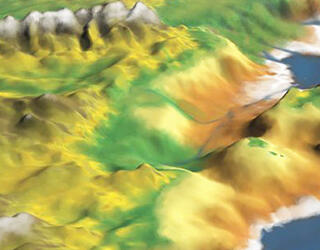At the Musée de l’Homme anthropology museum in Paris, an exhibition traces the movements of Homo sapiens across the long history of humanity. To address this complex topic, often the subject of fanciful representations, the scientific curators approached it from multiple points of view, including...
Article
03.27.2025
The metabolism of astronauts, the behaviour of plants, the reactions of living beings to radiation and of foams to weightlessness… The International Space Station does not only observe Space, as evidenced by the following four experiments.
Article
03.26.2025
How to measure the dislocation of ice floes, the immense expanses of ice floating in polar seas? Easy! Create a model of the ice pack, find the best way to shake it, and watch as it breaks under the effect of waves.
Slideshow
03.19.2025
Our topics
01.29.2025
Based in Namibia, the H.E.S.S. telescope array monitors the showers of particles produced when the highest-energy cosmic rays ever observed in the Universe impact the Earth's atmosphere.
Article
01.29.2025
Researchers have developed the world’s first index evaluating prison conditions, attesting to the enforcement – or more often the violation – of the fundamental rights of inmates. The results for...
01.22.2025
Are the dinosaurs in “Jurassic Park” realistic? How does the film franchise explore the impact and applications of science? These are some of the topics addressed in a book published last autumn, as...
Article
01.21.2025
Ten years after the terrorist attack against Charlie Hebdo, the legal expert Thomas Hochmann points out the difficulty of regulating freedom of expression without veering into censorship, especially...
01.20.2025
Astronomical observatories can yield exceptional discoveries, but they are sometimes built with little regard for the environment and local people, sparking public opposition. The sociologist and...
Article
01.15.2025
As a remake of the 1922 film Nosferatu was recently released, the sociologist Arnaud Esquerre takes a new look at the vampire – a figure that, from its emergence in the 18th century to the present...
Article
01.14.2025
Light, soft, resistant, deformable, and sometimes tacky, knitted fabric is not just an everyday object, it is also a metamaterial whose extraordinary properties are of great interest to physicists.
Article
12.11.2024
At a ceremony held in Paris recenlty, the biologist Edith Heard was handed the CNRS Gold Medal, one of the most prestigious French scientific distinctions, for her outstanding research on epigenetics...
12.06.2024
Over 5 million years ago, the Mediterranean Sea dried up, giving way to a salt flat stretching as far as the eye could see. A look back at the Mediterranean basin’s last great hydrological crisis.
Article
12.04.2024
A genuine technological gem, the James Webb Space Telescope has been exploring the smallest nooks of the Universe over the last two years. From the birth of planets and the first galaxies to the...
Slideshow
12.04.2024
As indicators of the degradation of permafrost – permanently frozen soil – in mountainous areas, molards are receiving special focus from researchers. In his laboratory in Caen (northwestern France...
Article
12.02.2024
While very useful in ecosystems, mosquitoes tend to ruin the lives of humans. A CNRS team has even recently calculated how much these dipterans cost society, primarily due to the diseases they...




















